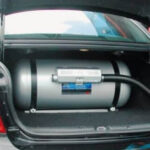The influx of Chinese firms in the auto industry as they churn out different brands, both imported and locally assembled vehicles, is attracting excitement and reservations from Nigerians.
While some believe the influx could crash the prices of vehicles, others fear that Nigeria could be flooded by vehicles that are not so reliable given the country’s terrain and poor road networks.
- Woman, 4 kids killed in Zamfara airstrikes
- Buhari dines with N/Assembly members, vows to end insecurity
In March, GAC, a Chinese automobile maker, signed an agreement with the Lagos State government to produce brand new cars. Lagos also signed another agreement with CIG Motors to set up an assembly plant in Lagos to start making environment-friendly cars.
Just last Friday, the Chinese Ambassador to Nigeria, Mr Cui Jianchun, hailed the partnership between Nigeria and GAC Motors during the handover of some GAC vehicles to the Chinese diplomatic corps in Abuja.
He said Nigeria has rich human resources, especially youths that GAC Motors can work with to make a difference.
The General Manager, Commercial, GAC Motors in Nigeria, Mr Jubril Arogundade, described the company as the future of Nigeria’s industrialisation and economic growth, saying it would be setting up its plant in Nigeria within the next 18 months.
Data obtained from the National Automotive Design and Development Council (NADDC) showed that Nissan, VW, Hyundai, Kia cars and SUV, Shacman, Sino FAW and MAN Trucks and Ashok-Leyland buses are now assembled in Nigeria.
At least 12 new companies have been given bona-fide manufacturing status in Nigeria by NADDC. They are Honda and Century Auto (Toyota), TATA, Coscharis Auto (FORD, Joylong, Dongfeng), Globe Motors (Higer), Leventis (FOTON-Daimler), Kewalram Chanrai (GM, Mitsubishi), Tilad (Shinery) and Aston.
However, prices of brand new vehicles are still on the rise and this is unsettling a lot of people who yearn to own a car but cannot afford one.
Although some auto industry experts said the Chinese big entrance was expected given the large market size of Nigeria, they however noted their concerns.
But Mr Luqman Mamudu, a former Director of Policy at the NADDC, said the Chinese firms’ entrance is a plus.
“The 10-year Nigeria Automotive Industry Development Plan (NAIDP) launched in 2014, opened up investment opportunities for start-ups. That was when China expanded its automotive technology in Nigeria directly and through Nigerian entrepreneurs.
“Before then, the assemblers remained largely the six plants established by the Nigerian government between the 70s and 80s. The whole plants were signed in agreement with Europe viz Mercedes, Fiat, Styre, Peugeot, Leyland and Volkswagen. So China’s entry made it easy for Nigeria to increase its installed capacity for assembly from a mere 150,000 in 2014 to a little over 500,000 by 2019.”
He lauded the Asian country for taking the risk to dive into the murky auto industry of Nigeria with fluctuating policies.
“For instance, there is 10 percent import duty for fully built trucks whereas imported Semi Knocked Down (SKD) for similar trucks is 10%. So, from my perspective, Chinese incursion into the Nigerian market is a plus, I don’t see any disadvantage.”
Also speaking, an automotive expert, Dr. Oscar Odibo, said the Chinese are emboldened by the successes of Korean and German cars, among others in Nigeria.
He also said the Chinese brands are not as reliable as other brands in Nigeria. “Back in the days, Nigerians did not want to look at any car that is not Japanese or German. So the coming of Kia and other Korean brands – Hyundai and their successes over the years, changed things. These brands did not succeed initially but they persevered.
“They continued to bring their auto products into the market and with time they have succeeded. “The more people see these vehicles – cars and trucks – on the roads purchased by the government, the more the ordinary people would want to buy and the higher their chances of survival,” he noted.
He said while the Chinese vehicles are affordable, the quality cannot be compared to other models. “Their parts are not as reliable as the product itself,” Odibo stated.
Another auto dealer, Mr Femi Olawale, cautioned against the Chinese incursion, saying they might not be able to withstand the Nigerian terrain.
He said: “Chinese made cars are not strong enough for our roads. I believe so much in Japanese and this is what an average Nigerian is familiar with.
“It would have been better if we had any of these Japanese made cars assembled in Nigeria. Cars like Toyota, Nissan, Honda, and even the Koreans are far better and generally accepted worldwide than Chinese cars.”
We’re promoting local manufacturing – Agency
When contacted, officials of NADDC said the council has put together a Local Automotive Components/Parts Development Fund to develop local auto manufacturing.
“A major factor that has militated against the development of the sub-sector has been inadequate capitalization and funding. Apart from working capital requirements, a lot of forex is needed because currently more than 70 per cent of the sector’s material inputs are imported. The current high interest rate charged by commercial banks makes long-term loans unattractive,” the council said.
The council said it has received applications of over N10 billion from 63 companies since inception in 2004.
The council said the applications were assessed and passed to the Bank of Industry for further financial assessment before final loan approval and disbursement.
NADDC said N9.98bn has been disbursed to 27 companies and more loan applications are being processed.

 Join Daily Trust WhatsApp Community For Quick Access To News and Happenings Around You.
Join Daily Trust WhatsApp Community For Quick Access To News and Happenings Around You.



